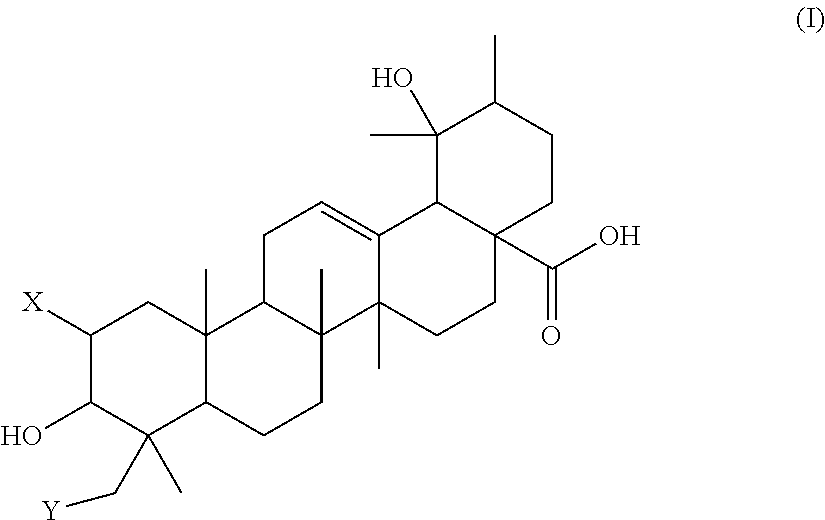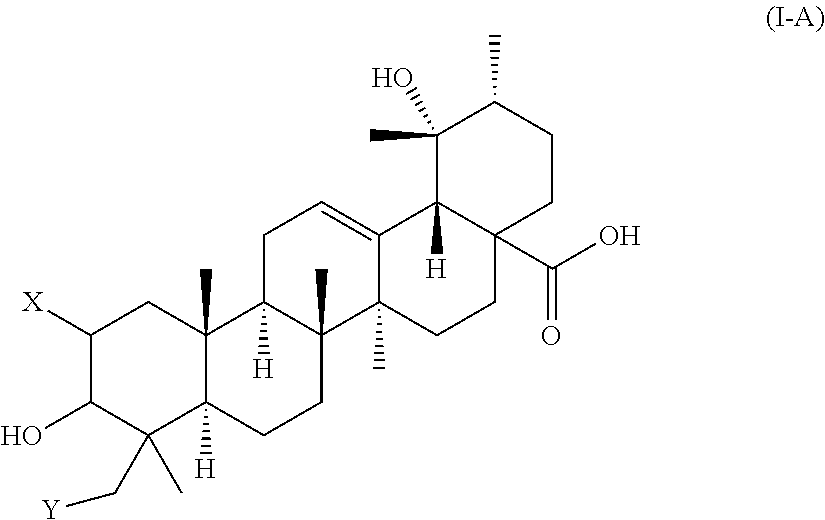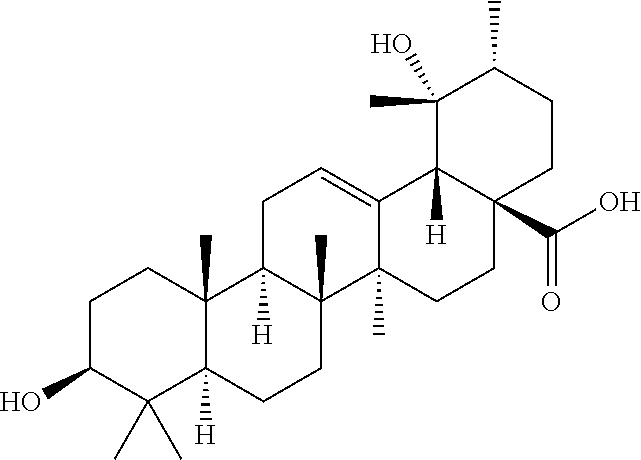Polyhydroxylated pentacyclic triterpene acids as HMG-COA reductase inhibitors
a technology of polyhydroxylated pentacyclic triterpene acids and hmgcoa reductase inhibitors, which is applied in the direction of drug compositions, dispersed delivery, metabolic disorders, etc., can solve the problems of affecting the synthesis rate of cholesterol, affecting the effect of statins, and affecting the effect of cholesterol synthesis
- Summary
- Abstract
- Description
- Claims
- Application Information
AI Technical Summary
Benefits of technology
Problems solved by technology
Method used
Image
Examples
example 1
Preparation of an Enriched Amelanchier alnifolia Berry Extract
[0304]950 g of dried Amelanchier alnifolia berries (obtained from freshly collected berries in Sasketchewan, harvest season 2008) were powdered by using a laboratory mill and extracted for 30 minutes at room temperature with 1600 ml of 70 vol. % ethanol twice using ultrasonic irradiation. The resulting supernatant was separated from the remaining material and concentrated under reduced pressure. The remaining aqueous phase was adjusted with water to a final volume of 750 ml and was extracted two times with 750 ml ethyl acetate by liquid / liquid separation. The organic phases were combined and the organic solvents evaporated under reduced pressure. The resulting residue was then freeze-dried and the amount of the resulting dry extract was determined. Typical yields were about 5.4 g which typically contained about 4% of euscaphic acid, 1% of tormentic acid, 1% of myrianthic acid, 15% of ursolic acid, 3% of corosolic acid, 15...
example 2
Preparation of an Enriched Amelanchier alnifolia Berry Pomace Extract
[0305]100 g of wet Amelanchier alnifolia berry pomace (obtained from freshly collected berries in Sasketchewan, harvest season 2011) were extracted for 30 minutes at room temperature with 600 ml of 70 vol. % ethanol twice using ultrasonic irradiation. The resulting supernatant was separated from the remaining material and concentrated under reduced pressure. The remaining aqueous phase was adjusted with water to a final volume of 250 ml and was extracted two times with 250 ml ethyl acetate by liquid / liquid separation. After evaporation of the organic solvents under reduced pressure, the resulting residue was freeze-dried and the amount of the dry extract determined. Typical yields were about 370 mg of dry extract containing 10% of euscaphic acid, 2% of tormentic acid, 2% of myrianthic acid, 2% of ursolic acid, 2% of corosolic acid, 15% in total of caffeoylquinic acids, 24% in total of quercetin and quercetin mono-g...
example 3
Isolation of Euscaphic Acid
[0306]Four liquid chromatography steps were optimised for purification of euscaphic acid. All purification steps were performed at room temperature (about 20° C.) on a preparative HPLC system (Gilson Abimed, Ratingen, Germany), comprising Gilson Unipoint software, 305 or 306 binary pump system, 204 fraction collector, 155 UV-Vis detector, 806 manometric module, and 811C dynamic mixer, using gradients and stationary phases as described below. A total of 4.8 g of the dry extract obtained according to example 1 were separated on a reversed phase material by medium pressure liquid chromatography on a Chromabond® (Trademark by Machery-Nagel GmbH & Co. KG, Düren, Germany) 100-20 C18ec column, 130×40 mm, (Macherey & Nagel) with a flow rate of 20 ml / min whereas the fractions were collected each minute using the following binary gradient and solvents, which were acidified with 0.1 vol. % of trifluoric acid (TFA): begin 10% (v / v) B, 60 min 70% (v / v) B, 70 min 100% (...
PUM
| Property | Measurement | Unit |
|---|---|---|
| wt. % | aaaaa | aaaaa |
| molecular weight | aaaaa | aaaaa |
| molecular weight | aaaaa | aaaaa |
Abstract
Description
Claims
Application Information
 Login to View More
Login to View More - R&D
- Intellectual Property
- Life Sciences
- Materials
- Tech Scout
- Unparalleled Data Quality
- Higher Quality Content
- 60% Fewer Hallucinations
Browse by: Latest US Patents, China's latest patents, Technical Efficacy Thesaurus, Application Domain, Technology Topic, Popular Technical Reports.
© 2025 PatSnap. All rights reserved.Legal|Privacy policy|Modern Slavery Act Transparency Statement|Sitemap|About US| Contact US: help@patsnap.com



